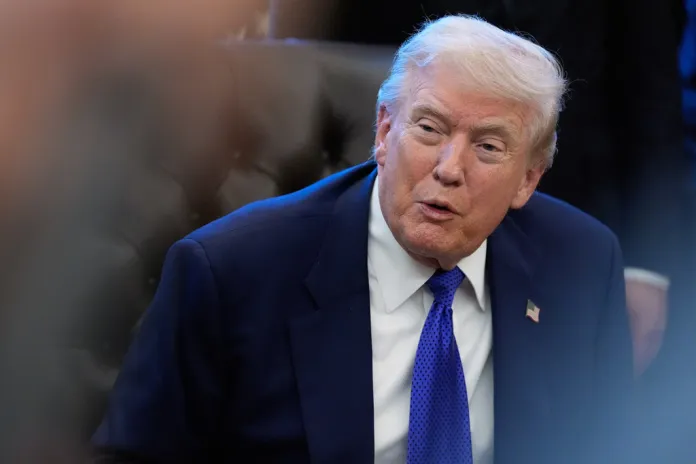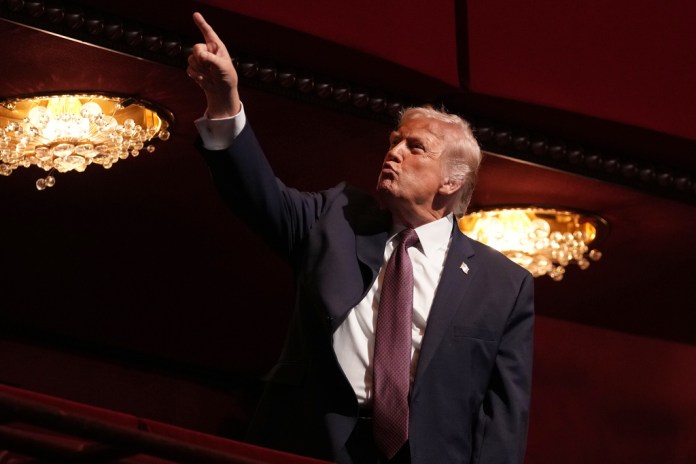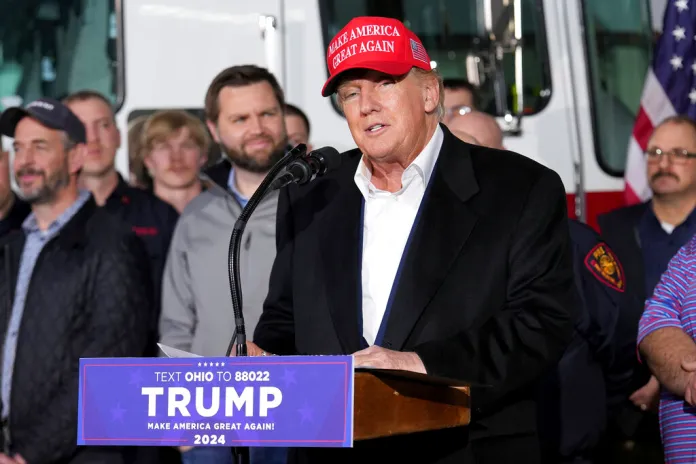Trump Admin Doesn’t Need To Bring Regime Change To Venezuela
The text presents a critical comparison between former President Donald Trump’s and President Joe Biden’s policies toward Latin America and the Caribbean. It praises Trump’s adoption of a Bismarckian realpolitik approach, which aims to fill geopolitical power vacuums in the Western Hemisphere created by the Biden governance’s perceived inaction and ideological focus. Trump’s strategy involves pragmatic,transactional engagement with governments in Mexico,Colombia,and Venezuela,emphasizing national security,law enforcement cooperation,and economic development while avoiding direct military intervention,particularly in Venezuela.
In contrast, Biden’s approach is described as weak and naïve, characterized by an emphasis on addressing the “root causes” of regional problems, focusing on climate change, social issues, and promoting open borders per the 2022 Los Angeles Declaration on Migration.This, the text argues, has encouraged illegal migration, empowered criminal cartels, and destabilized the region. Biden’s administration is also criticized for lacking firm demands on Mexico and for diplomatic reliance on individuals sympathetic to left-wing Latin American actors.
The Trump administration, led by figures like Secretary of State Marco Rubio and Deputy Christopher Landau, is credited with refocusing U.S. diplomacy on pragmatic security concerns, revitalizing bilateral cooperation, and expecting greater accountability from regional organizations such as the Institution of American States.The deployment of U.S. naval assets to the caribbean under Trump signals a renewed commitment to hemispheric security, but the text warns against costly military interventions that resemble past nation-building failures.
the piece advocates for a balanced “good neighbor policy” based on security, peace, and economic growth, while calling out corruption and organized crime in the region. It suggests that trump’s realpolitik approach corrects Biden’s failed policies and better protects U.S. interests in the Americas.
President Donald Trump is implementing Bismarckian realpolitik in the Western hemisphere, filling dangerous geopolitical power vacuums created by the Biden administration. On the Mexican frontier, in Central America and the Caribbean basin, Biden repeatedly failed to act to protect the national interest, allowing these key regions to become staging areas for hostile actors and criminals to strike the U.S. homeland.
President Trump’s renewed transactional engagement with unfriendly governments in Mexico, Colombia, and Venezuela is an overdue rebalance after years of U.S. inattention and mismanagement that empowered illegal migration networks and freebooting organized crime.
That said, a U.S. boots-on-the-ground military intervention in Venezuela should be avoided. Such an action is not a required element of Trump’s refreshing renewal of the Monroe Doctrine spirit. Similarly, the administration would be wise to seek congressional authorization for U.S. military strikes on drug-smuggling boats on the high seas because controversy surrounding those attacks should not distract from the need for Washington to repudiate and reverse Biden’s foolish hemispheric security policies.
Long term, Trump should pursue a “good neighbor policy” in the Americas, built on security, peace, and economic development, but it is naïve to believe that current hostile governments in the region make such an approach possible. As a good neighbor, the U.S. should stop intervening in the Americas to impose Washington elites’ solutions to long-standing injustices; but the president can and should call out corrupt governments that facilitate powerful organized crime groups, particularly when that criminality strikes at the U.S. homeland.
As Trump has done, a genuine good neighbor must end mindless policies that accelerate massive and lawless cross-border people flows and recognize that hemispheric economic development requires citizens to remain in their countries in order to build them. When that does not happen, the region is left with corrupt ideological dinosaurs like Cuba.
Biden’s Weak Diplomacy
President Joe Biden’s policies illustrated a deeply ingrained ideological conviction that Washington should address “root causes” of injustices in the region and that the U.S. must atone for historical misdeeds. Biden’s diplomacy emphasized fads such as prioritizing climate change in struggling economies and wokeism in traditional and Catholic societies. The U.S. provided financial assistance to nongovernmental organizations and local elites to support these Washington-establishment priorities, likely causing more shrewd Chinese diplomats in the region to guffaw.
The centerpiece of Biden’s approach was the unprecedented demand in 2022 in the Los Angeles Declaration on Migration that governments in the Americas throw open national borders to unlawful migration. In regions already overwhelmed by organized crime groups, widespread corruption, and the lack of rule of law, Biden’s diplomacy pressured governments to absorb the destabilizing consequences of massive illegal migration. The resulting maelstrom put hundreds of thousands of migrants at risk of human trafficking and provided billion-dollar profit booms to criminal cartels.
Biden’s diplomatic neglect was most evident in his approach to Mexico, where the former president refused to exercise any leverage to protect the United States. Serious states pursue their national interests. Biden’s record with Mexico can point to very few, if any, demands that the administration made on former Mexican President Andres Manuel Lopez Obrador (known as AMLO). Vital bilateral law enforcement cooperation disappeared.
Trump Administration Forges Enlightened Realpolitik
Under Trump, Secretary of State Marco Rubio and his deputy Christopher Landau are dedicated to forging a new enlightened realpolitik across the Western hemisphere. Rubio’s first international trip was to El Salvador, not Brussels. Landau’s first visit was to Mexico, a country where he previously served as Trump’s ambassador. Under Rubio, the State Department is back to basics: speaking up for our friends, rejuvenating law enforcement cooperation, promoting U.S. deportation diplomacy, and calling out bureaucratic ineptness and corruption inside the Organization of American States. The OAS must prove its worth or expect U.S. funding to cease.
President Trump is remaking the mismanaged U.S.-Mexican bilateral relationship. Our undefended southern border is no longer an afterthought to Washington’s out-of-proportion diplomatic engagement in Europe or, worse still, years of U.S. troop deployment and nation-building in Central Asia and the Middle East. Putting tariffs in his diplomacy tool kit, Trump has made clear to his Mexican counterpart that the large bilateral commercial relationship is, and will always be, directly linked to U.S. security concerns.
Biden Admin’s Naïve Approach
The truth is that Biden never had much interest in Latin America (he made a total of three perfunctory short trips to the region as president: to Mexico, Peru, and Brazil). The former president was pleased to hand over the management of the region to Secretary of State Antony Blinken and others like Department of Homeland Security Secretary Alejandro Mayorkas (Cuba-born) and National Security Council advisor Juan Sebastain Gonzalez (Colombia-born). Mayorkas and Gonzalez, both U.S. woke-leftists, thought with their Latino roots they could develop a special relationship with regional radicals like Colombia’s Gustavo Petro. They offered a diplomatic mix of misplaced charity and gringo guilt, a package that presented U.S. weakness to a region full of hostile actors.
To that crew, Biden added his old Senate pal Chris Dodd as special advisor for the Americas. Dodd’s long record in promoting U.S. interests in the Western Hemisphere was always colored by his sympathy for far leftwing actors, whether it was Fidel Castro in the 1970s, Daniel Ortega in the 1980s (recall the “Dear Comandante” letter), or Hugo Chavez in the early 2000s.
State Department career officials wondered why, during the Biden administration, Dodd regularly went out of his way to engage the Hugo Chavez-created hemispheric regional organization known as the Community of Latin American and Caribbean States (CELAC). Dodd’s outreach to CELAC symbolized the Biden administration’s deeply held view that the exercise of U.S. power in the region is always suspect because once there had been a United Fruit Company and a Bay of Pigs landing.
This naïve approach was on full display during Biden’s last year of interaction with the Maduro regime in Venezuela. After Maduro lost national elections in July 2024 and refused to leave office, Secretary Blinken astonishingly turned to Mexico, Colombia, and Brazil to represent the hemisphere in negotiating with Maduro. In Blinken’s dubious judgment, AMLO could best persuade the Venezuelan strongman to leave office. Of course, the Mexican president felt a deeper kinship with Maduro than he did with Biden.
Trump’s Deploying Navy Assets
This is the context in which the Trump administration has now deployed U.S. naval assets, including the Gerald R. Ford aircraft carrier group, to the Caribbean. None of this means that Trump should now invade Venezuela à la the U.S. action against the Panama of Manuel Noriega in 1989. There are many reasons to display U.S. military might that do not lead to landing Marines or dropping paratroopers on Caracas. There are also many reasons to think Trump holds dear the hard lessons of Iraq and Afghanistan.
Realpolitik recognizes that U.S. boots-on-the ground military action would open up a Pandora’s box of unknowns and likely tie down Washington with Venezuela’s unsolvable problems for years. It would be a Latin reprise of Iraq and Afghanistan, and inevitably plunge the U.S. into more doomed nation-building. The State Department’s failed Merida Plan, which in vain sought to remake Mexico’s legal system and end state corruption, should be a loud warning to the can-do optimists who think that countries in Latin America can more easily be re-made.
That said, realpolitik still recognizes Maduro is a major problem because he destabilizes and invites hostile actors into the Americas. If Maduro re-consolidates power, he will return to subverting friendly governments and exporting criminality into the U.S. homeland. The greatest engine in pushing migrants out of Venezuela (some 8 million out of a country of 28 million inhabitants) has been Maduro’s repression. It was Biden migration policies, at the same time, that signaled to hundreds of thousands of Venezuelans that they should “surge to our border.”
President Trump’s new realpolitik approach in the Caribbean is a long overdue reversal of Biden’s incoherent policies.
A retired career U.S. diplomat, Phillip Linderman is chairman of the Ben Franklin Fellowship and a board member at the Center for Immigration Studies.
" Conservative News Daily does not always share or support the views and opinions expressed here; they are just those of the writer."



